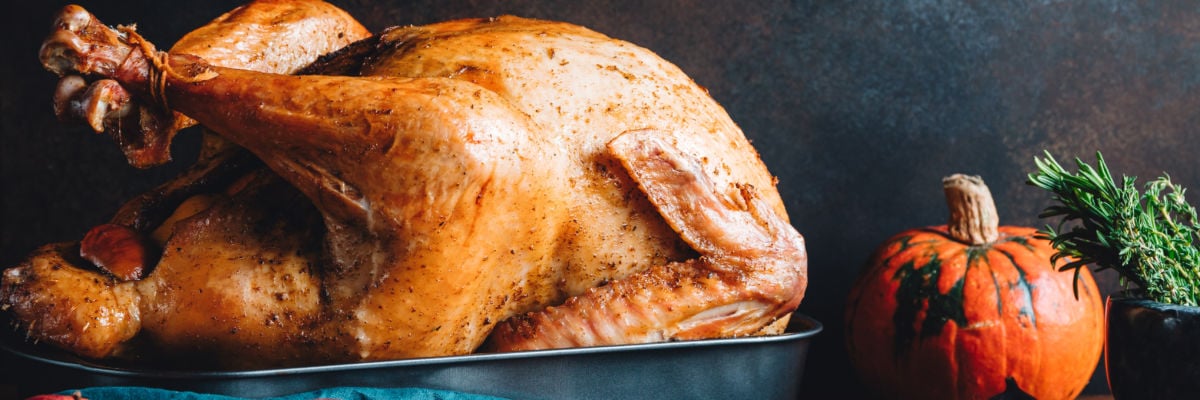
Did Ven. Pope Pius XII issue an indult in 1958 permitting American Catholics to eat turkey on the day after Thanksgiving—i.e., on Friday, a traditional day of abstinence from meat throughout the year?
Or was it actually Pope St. John XXIII, the man elected to succeed Pius XII a month before Thanksgiving that same year? Or did Pius XII (or John XXIII) simply give U.S. bishops ecclesiastical permission to dispense the faithful from abstaining from turkey the day after Thanksgiving?
Well, like a wonderful Thanksgiving buffet, there seems to be a bit of everything in this matter!
Evidence for the 1958 Turkey Indult
Enter Sharon Kabel, a librarian by profession and thus a prodigious researcher. Kabel has done yeoman work on this contentious culinary issue, first publishing an article five years ago that provides credible evidence that the papal indult was actually issued.
She cites a Q&A column of Fr. Daniel Brennan in The Pittsburgh Catholic, the newspaper of the Diocese of Pittsburgh. In the issue dated December 3, 1959, the Thursday after Thanksgiving, a person inquires why there was not a general dispensation to eat turkey on the Friday after Thanksgiving in 1959, as there had been the previous year. Brennan responds,
If you would insist that there is good cause for such dispensation because the Holy Father granted it in 1958, I would remind you that the pope does not need a justifying reason to dispense from mere Church law, and in granting the relaxation of the abstinence on the Friday after Thanksgiving in 1958 he set no precedent but granted a particular favor for a particular year.
Priests designated to handle Q&A columns in diocesan newspapers back in the day were known to be sticklers for getting basic facts right, particularly about the liturgy, and Kabel found no evidence of a correction of Brennan’s answer in ensuing issues of The Pittsburgh Catholic.
“This would seem to be the first documentary proof that the pope granted a ‘Turkey Indult’ to the Catholics of the United States in 1958,” Kabel states, “which he did not extend in 1959.” Despite the novelty of the dispensation, Kabel has not been able to find other media sources to confirm what Brennan matter-of-factly reports.
Editor’s note: It is possible, too, that Brennan simply took it for granted, going off the inquirer’s question, that the pope had in fact granted the indult. That is to say, “Even if you’re right that the pope granted an indult last year, that doesn’t mean he [or his successor] has to grant one again this year.”
Pius XII or John XXIII?
Kabel also makes a good argument that John XXIII, not Pius XII, provided the 1958 indult. First, Pius died on October 9 of that year. John XXIII succeeded Pius XII on October 28, and Thanksgiving fell on November 27. Although Pius could have issued the indult to the U.S. faithful in the waning days of his pontificate, more than a month and a half before Thanksgiving, it is unlikely that turkey-eating across the ocean was on his or anyone else’s mind that far in advance.
In addition, as Kabel reports in making her case for John XXIII, the pontiff issued a number of other “novel and diverse” indults during the first year of his pontificate, including dispensing the faithful worldwide from eating meat on December 26, 1959, because the day after Christmas fell on a Friday that year. John also issued a special dispensation enabling the faithful to eat meat on Friday May 1, 1959, given that Pius XII had designated it as “Catholic Labor Day” as a countermeasure to Soviet communists who commemorated the first day of the month as May Day. Later that same year, he granted another dispensation on the Vigil of the Assumption (August 14), which also fell on a Friday.
Such dispensations were typically given on “short notice,” Kabel says—typically within a week—which also makes Pius XII less likely to have given the Turkey Indult in 1958.
Turkey Indult Pushback and Counterpoints
A number of sources have questioned the historicity of the papal Turkey Indult, citing responses from Fr. Aidan Carr, OFM Conv.’s “Questions Answered” column in the Homiletic & Pastoral Review—one in 1962 and one in 1963—which show that some U.S. bishops themselves issued Turkey Indults in the early 1960s, based on faculties granted by John XXIII to do so.
Kabel rightly responds that such dispensations “do not have bearing on the question of the [papal] Turkey Indult.” In addition, in her original article, Kabel provided similar documentation that a number of U.S. bishops issued their own Turkey Indults in the early 1960s based on permissions from Rome, including Cardinal John Wright in 1960 in the Diocese of Pittsburgh and—in succeeding years—the Dioceses of Connecticut along with Stockton, Santa Rosa, and San Francisco in California.
Others cited an article Fr. T. Lincoln Bouscaren in the Canon Law Digest in 1963, in which the eminent canon lawyer made reference to the quinquennial faculty to U.S. bishops that John XXIII had renewed in 1962:
In a letter of 13 January 1962 His Eminence, the Cardinal Prefect of the Sacred Congregation of the Council, has graciously informed me that the faculty of the Most Reverend Ordinaries of the United States to dispense from the laws of fast and/or abstinence on civil holidays has been renewed for another period of five years [indicating that Pius XII had last renewed the quinquennial faculty to dispense in 1957]. . . .
Note: To avoid misunderstanding, it should be remembered that it does not necessarily follow from the above document that all Ordinaries make full use of their faculties. . . .
Dispensation Faculty Available for the Friday After Thanksgiving Day: The U.S. Apostolic Delegate can delegate to local Ordinaries who request it, the faculty to dispense from abstinence on the Friday after Thanksgiving Day. The faculty, when granted, is valid for five years.
Kabel responded that,
despite this, Fr. Bouscaren’s Digest did not address a 1958 papal Turkey Indult. The writers citing this source merely suggested that the 1958 Turkey Indult was in reality a diocesan dispensation that fell under the existing permissions.
Whatever the case, why the lack of more evidence for the papal Turkey Indult of 1958? Kabel argues that, beginning in the latter years of Pius XII, frequent changes in the liturgy made the dispensation for Thanksgiving 1958 less newsworthy:
Remember, by 1958, Catholics had already seen numerous reforms, including a transformed Holy Week in 1955. Come 1960, there would be a colossal avalanche of changes. Hand missals constantly needing new inserts. New stuff at Mass every week. Reforms applied unevenly across dioceses.
Is it any wonder that we forgot such a small fact like the papal Turkey Indult of 1958? Who could possibly keep up with all of this?
As the author has noted in more recent years, she still has to remind people about what really happened more than sixty-five years ago: “There really was a one-time Turkey Indult issued in 1958 by Pope John XXIII.”
Epilogue: In the United States today, the faithful can partake of turkey on the day after Thanksgiving because abstinence from meat on Fridays outside Lent is no longer binding. Yet Friday remains a penitential day, and the Church permits “other forms of penance, especially works of charity and exercises of piety, in whole or in part, for abstinence and fast” (can. 1253).
In that light, the faithful could invite persons less fortunate than they to have food and fellowship the Friday after Thanksgiving, a day when some might otherwise experience isolation and loneliness. They might also abstain from turkey, uniting their sacrifice with our Lord’s one paschal offering, and donate some or all of their leftovers to a nearby shelter or food pantry. Or they could abstain from turkey on Friday and invite someone less fortunate to enjoy a good meal on the ensuing Saturday, which is also traditionally a great day to enjoy college football.
In any event, we remain the Church Militant this side of the grave, and so joyfully carrying our cross remains a non-negotiable in advance of Christ’s Second Coming (Matt. 16:24-26).



